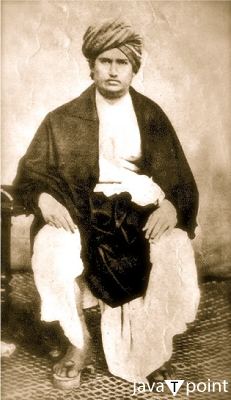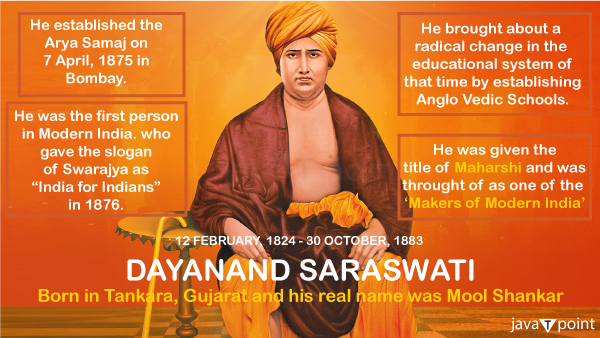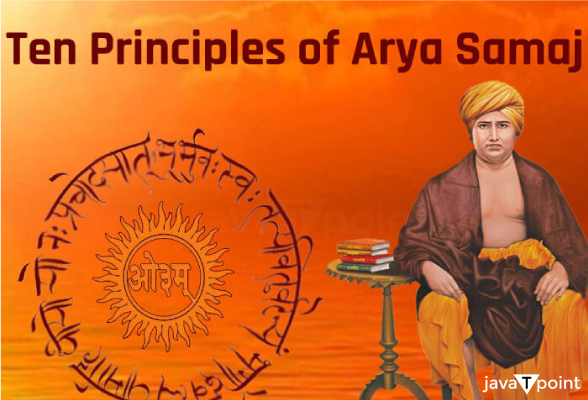Swami Dayanand Saraswati
Introduction
On February 12, 1824, Swami Dayanand was born in Tankara, in the Gujarat state of western India. During a period when Hinduism was split between several philosophical and theological schools, Swami Dayanand turned directly to the Vedas, regarded as the ultimate source of knowledge and integrity expressed in the "Words of God." Satyartha Prakash, Rig-Vedaadi, Bhasya-Bhoomika, and Sanskar Vidhi are the main religious texts that Swami Dayanand produced and published to revitalize Vedic knowledge and reawaken our awareness of the four Vedas—the Rig Veda, Yajur Veda, Sama Veda, and Atharva Veda.

Under Swami Virjanand, Maharshi Dayanand finished his Vedic education in 1864. After that, he traveled throughout India till 1874 AD. In 1874 AD, Maharshi Dayanand wrote Panchmahayajya Vidhi, his first significant work of writing. To print and propagate his writings and Vedic literature, Swami himself established the Paropkarini Sabha in the Indian city of Ajmer in 1882.
Life of Swami Dayanand Saraswati
The originator of Arya Samaj was Swami Dayananda Saraswati. He was a distinguished Hindu religious preacher as well as a social reformer. Although he was brought up in the traditional Hindu way, he quickly became dissatisfied with the antiquated beliefs and customs, particularly idolatry and other forms of primitivism that were forced upon him. He left his family when he was 19 years old and began a protracted, intense, and austere study of the Vedas, the earliest texts that form the basis of Hinduism.

In 1875 A.D., Dayananda Saraswati founded Arya Samaj. He founded this "Samaj" to aid in the revival of Hindu society. He was born in a Gujarati Brahmin household. He was a pundit in Sanskrit. He was not fluent in English. He was a Saint when he first got in touch with Keshab Sen. Afterwards, he dedicated the final eight years of his life to religious and societal change.
Early Life and Education of Swami Dayanand Saraswati
Dayanand Saraswati was born in Gujarat, a region of western India that was mostly cut off from the effects of British colonialism, on February 12, 1824, into a prosperous Brahmin family. Yashodabai was his mother, and Karshanji Lalji Trivedi was his father. His powerful and wealthy Brahmin family was a devout devotee of Lord Shiva. Because of his family's strong religious beliefs, Mool Shankar learned the value of fasting, righteousness, and purity at a young age.
He thought that the priest was using the knowledge of Vedas to exploit other sections of society who were Hindu but from other castes and also were promoting themselves as a knowledgeable person. In order to fulfill this objective, he established the Arya Samaj and promulgated Krinvanto Vishwaryam, or the Ten Universal Principles, as a system of universalism. He meant the entire world to be a habitation for Aryas (Nobles) with these ideas.
His next move was to bring a renewed focus on God to Hinduism. He traveled the nation, challenging priests and religious leaders to debates, and he consistently prevailed thanks to his command of Sanskrit and the Vedas. Hindu priests promoted traditions like feeding priests on anniversaries and taking a bath in the Ganges River, which Dayananda called superstitions or self-serving customs. They discouraged the public from reading Vedic texts. His goal was to convince the people to return to the Vedic teachings and adopt the Vedic way of life by urging them to reject such superstitious ideas. Additionally, he urged Hindus to embrace social reforms, stressing the value of cows for national prosperity and the necessity of Hindi becoming the official language for national unity.
How was Swami Ji's Life Transformed?
Moolshankar Tiwari was the name of Swami Dayanand Saraswati; he was a regular man who obediently obeyed his father. The family was constantly involved in religious rites because they were Brahmins by caste. His father had once commanded him to follow the nighttime fast, fast on the festival of Mahashivaratri, and worship God. Moolshankar followed the father's directions and fasted for the entire day. He also sat in the Shiva temple during the night, rising with a palanquin(Palki).
He witnessed a sight in the temple at midnight where a horde of rats had surrounded the God idol and was devouring all of the prasad. Moolshankar Ji then wondered, What can we expect from this God idol if it is just a stone boulder that cannot defend itself?
That one occurrence greatly impacted Moolshankar, and he decided to leave his home in order to acquire self-knowledge. With the information he gained, he became Maharishi Dayanand Saraswati from Moolshankar Tiwari.
Dayanand Saraswati and Arya Samaj
Dayanand Saraswati founded the Arya Samaj in Bombay on April 7, 1875. The Samaj's goal was to shift Hinduism away from the imaginary doctrines. The Samaj's motto was "Krinvan to Vishvam Aryam," which translates to "Make this world noble." The ten guiding principles of the Arya Samaj are listed below.

- All true knowledge and wisdom obtained by knowledge have their efficient cause in God.
- God exists, is sentient, and is happy. Formless, omniscient, merciful, unborn, everlasting, unchanging, beginningless, unequaled, omnipresent, immanent, unaging, immortal, fearless, eternal, and holy, and the creator of everything, he is also the supporter and the master of all.
- The holy books of all genuine knowledge are the Vedas. All Aryas have a primary responsibility to read, teach, recite, and listen to them.
- Always be prepared to give up lies and accept the truth.
- Every action should be carried out in line with Dharma, that is, only after carefully considering what is right and wrong.
- The main goal of the Arya Samaj is to improve everyone's bodily, spiritual, and social well-being in order to accomplish good in the world.
- Love, fairness, and righteousness should be our guiding principles in all that we do.
- We have to spread Vidya (knowledge) and eradicate Avidya (ignorance).
- Instead of focusing exclusively on advancing one's interests, everyone should strive to advance the interests of everyone.
- While everyone should be free to follow the laws of their welfare, one should consider oneself restricted to adhering to the social norms designed to advance everyone's well-being.
The Significance of Hindi Language Arya Bhasha
Due to the strict Sanskrit language, Swamiji used to deliver lectures around the nation with the goal of spreading Vedic propaganda. He had no trouble reading the Vedas since he had begun to read and comprehend Sanskrit in his early years. He had once traveled to Calcutta, where he had met Keshav Chandra Sen. Keshav Ji was also affected by Swamiji. Still, he suggested to Swamiji that instead of giving his lecture in Sanskrit, he should offer it in Hindi, an Arya language, so that both intellectuals and common people could hear his thoughts. Afterward, Swamiji began delivering in Hindi in 1862, and then the nation also decided to adopt Hindi as its native tongue. Post that, Swamiji got a large following, and his ideals were embraced. In Punjab province, Aryasamaj received the highest support.
Contribution to the Revolution of 1857
He began criticizing the British after leaving the house in 1846. As he traveled the nation, he discovered that many others harbored grievances against British rule as well; they needed the right direction, so they gathered those who worked for the British. Swamiji also had an impact on the great heroes of the era, such as Tatya Tope, Nana Saheb Peshwa, Haji Mulla Khan, Bala Saheb, etc. These were the persons who worked for Swamiji. Following the public awareness campaign, everyone was given the responsibility of spreading the word, fostering relationships, and fostering solidarity. To do this task, he also created the Roti and Kamal scheme and began linking everyone in support of national independence. He began by uniting the saints to inspire the common person to pursue freedom through them.
Swamiji told everyone that despite the failure of the 1857 revolt, he was not depressed. He thought that the end of slavery would not be only possible via fight, and it might take a long struggle to get rid of it. He advised everyone to be joyful because the country would be free in the next few years as the liberation movement had begun.
His ideas preserved the people's spirits. Following this revolution, Swamiji went to his guru, Virjanand, to begin learning Vedic knowledge and spreading new concepts throughout the nation. Under the direction of his Guru, Swamiji carried out the task of societal redemption.
His Spiritual Beliefs
Maharishi Dayanand was a follower of Hinduism, as it is described in the Vedas, without any additions or modifications. To him, maintaining the integrity of the faith was paramount. He was a fervent supporter of Dharma principles because he saw them as the epitome of honesty and impartiality. Adharma, in his view, was anything that contradicted the Vedic precepts and was not just or fair.
He counseled his compatriots to focus their energies on improving humanity as a whole rather than squandering them on pointless rituals. He outlawed the worship of idols, viewing them as a pernicious intrusion brought about by the priesthood for its gain. He opposed caste segregation and other social ills like superstitions. He promoted the idea of Swarajya, which is defined as a nation devoid of outside influence and brimming with the splendor of just and equitable citizens.
Opposition Against the Morally Unacceptable Behaviors That Were Prevalent in Society and the Unifying Lesson
Maharishi Dayanand Saraswati spoke out against the wicked customs and beliefs that were pervasive in society because he believed that he was accountable for it.
- Child Marriage Protest: Child marriage was a common practice at the time, and everyone was happy to follow it. Then, using the scriptures, Swamiji awakened the populace against this practice. According to his explanation, child marriage is considered a misdemeanor since the scriptures reference brahmacharya, which is the 25 years of progress in human life. He asserted that child marriage weakens the individuals involved and increases the risk of early mortality.
- Widow Remarriage: Back then, and even now, there is still a lot of sensuality in the nation. The number of widowed women in the nation continues to decline. Dayanand Saraswati Ji denounced this same thing, and even in those days, they voted in favor of remarriage and raised awareness of it out of respect for women.
- The Message of Unity: It was Dayanand Saraswati Ji's dream—which remains unfinished to date—to see all religions and his adherents seated under one banner. They felt that this distinction must be eliminated because the third party constantly exploits mutual fighting. Despite chairing numerous sessions, he was unable to unite the religions of Islam, Hinduism, and Christianity.
- Conflict of Characters: He consistently maintained that the scriptures are not words of variance but rather the varna system, in which each person is valuable, and every one of the four varnas is essential to the harmonious operation of society. He opposed the varna and advocated for equal rights for all social classes.
- Nari (Woman) Education and Equality: Swamiji has always backed the power of women. He thought that women's education was essential to society's advancement. He referred to women as society's foundation. He asserted that women need to be educated to have conversations with males about every aspect of life.
Conspiracy Against Swamiji
The administration of Britain had begun to dread Swami Ji. They saw Swamiji's speech as a sign of their defeat and began closely observing him because it had a significant effect on the nation. Despite facing mockery, Swamiji never gave up in front of his officer or the British Government. As a result, the British Government started to question Swamy's authority, which prompted them to want to have him killed. Despite being poisoned numerous times, Swami Ji never suffered any harm because of his mastery of yoga.
Final Conspiracy
In 1883, Swami Dayanand Saraswati paid a visit to the Maharaj of Jodhpur, King Yashwant Singh, who warmly welcomed him. During his stay, Swamiji attended several lectures. One day, he observed Yashwant Singh engaged in conversation with a young dancer. Uncomfortable with the indulgent atmosphere, Swamiji respectfully explained to the king that true knowledge couldn't be acquired amid such worldly pleasures.
In response to Swamiji's observations, Yashwant Singh decided to renounce his worldly connections. This decision upset the young dancer, who, along with the Cook, retaliated by adding glass fragments to Swamiji's food, exacerbating his condition. Despite receiving medical treatment, Swamiji's health did not improve.
The Cook admitted his mistake, apologized, and Swami Ji forgave him. Subsequently, Swamiji was transferred to Ajmer on October 26, 1883. Unfortunately, his health continued to deteriorate, and on October 30, 1883, Swami Dayanand Saraswati passed away.
Works from the Life of Swami Dayanand Saraswati
In the course of the independence struggle, Swami Dayanand Saraswati authored the renowned book "Satyartha Prakash," a transformative work that influenced numerous lives and imparted insights into the quest for freedom. The Maharishi advocated for living in accordance with moral principles and steadfastly upholding righteousness and Dharma in one's duties and responsibilities. A strong proponent of the concepts of rebirth and reincarnation, Swami Dayanand Saraswati attracted notable followers such as Pandit Lekh Ram, Lala Lajpat Rai, and Madam Cama.
Conclusion
In conclusion, Swami Dayanand Saraswati, born on February 12, 1824, in Tankara, Gujarat, played a pivotal role in reshaping Hinduism and contributing to India's independence movement. Turning to the Vedas as the ultimate source of knowledge, he authored influential works like "Satyartha Prakash" during the freedom fight, advocating for moral living and commitment to Dharma.
Swami Dayanand's early life and education, marked by a transformative spiritual experience, led him to become a profound religious preacher and social reformer. Founding the Arya Samaj in 1875, he aimed to revive Hindu society, emphasizing principles such as truth, righteousness, and social welfare.
His opposition to morally unacceptable practices, including child marriage, Sati, and caste segregation, demonstrated his commitment to societal reform. Swami Dayanand envisioned a united nation, free from external influence, where all religions coexisted peacefully.
Despite facing conspiracies and attempts on his life, Swami Dayanand continued his mission. His teachings inspired prominent figures like Pandit Lekh Ram and Lala Lajpat Rai. Unfortunately, he succumbed to poisoning in 1883, leaving behind a legacy of spiritual wisdom, social reform, and a genuine call for national unity. Swami Dayanand Saraswati's contributions endure as a guiding light in the realms of spirituality, social justice, and the pursuit of a noble, enlightened society.